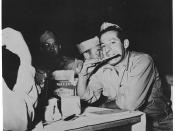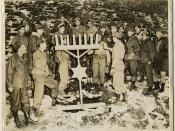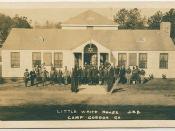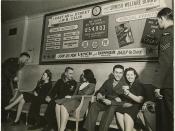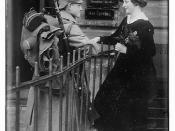In society, a soldier is very much respected and is only reasonable to view him superior to a person such as a merchant. Philosophers on the other hand, contradict this statement and write that a merchant who is a harmonious man should be held in a much higher position than a soldier whose only objective includes killing. John Ruskin, the English critic of art and society, argues that a soldier should be given precedence rather than a merchant or manufacturer. His argument is well written but in essence does not clarify why exactly the merchant is given fewer honors than a soldier.
The difference between a soldier and a merchant is illustrated in RuskinÃÂs passage lines 1-4; he writes that the profession of commerce is held at a low level as compared to the soldierÃÂs. Although he distinguishes the lowness of a merchantÃÂs position, he fails to state why the merchant is put in this level.
He only explains the custom that art and society bring to the table when deciding weather a soldier or a merchant should be admired. He disagrees with philosophers stating that ÃÂat first sight ÃÂit appears unreasonable to place ÃÂa peaceable and rational person, whose trade is buying and sellingÃÂin fewer honors than ÃÂan impeaceable and often irrational person, whose trade is slayingÃÂ. He, in contrary to philosopherÃÂs beliefs, agrees with the social respect for soldiers. He says they stand in a higher position and deserve much more for their sacrifice. Ruskin allows us to understand the opinion he holds against most philosophers, but his only argument is line 8 ÃÂAnd this is rightÃÂÃÂFor the soldierÃÂs trade, verily and essentially, is not slaying but being slain.ÃÂ Ruskin explains in this excerpt, that a soldier does his job everyday putting his life at stake. He isnÃÂt there to kill in essence, but to wait to be killed. Ruskin compares a soldierÃÂs job to that of a bravo, or hired assassin, the situation is incomparable. Although it seems like a convincing statement, Ruskin doesnÃÂt actually clarify how sacrificing one self for the country should be honored rather than being in charge of the countryÃÂs economy which can be very vital as well. He clearly explains to the readers that a bravo does not hold the same precedence as a soldier who ÃÂholds his life at the service of the stateÃÂ, which can be true, but what does this have to do with a merchant?Ruskin has an obvious judgment of weather a soldier is to be held above a merchant. Although he has a clear view of what a soldier is, and why he is held in such high ranking, Ruskin falls short when exemplifying why a merchant is given a lower status. The reader is not given a understandable illustration of what can make a merchant less of a person than a soldier. It seems as though he just illustrates the positive qualities of a soldier, and does not give us any negative traits of the merchant. A merchant is less and thatÃÂs just that!We know that apparently being a soldier is of great prestige, but what are the great qualities of being a merchant? If this passage is to convince the reader that in fact a soldier should be given precedence, shouldnÃÂt Ruskin explain why a merchant isnÃÂt given the upper hand? It is true that a soldier is a person whom should be looked up to and eulogized, but others may think that a merchant is important as well. Ruskin should establish the unimportance ness of a merchant compared to a soldier. Because what would happen to the country with no flow of trade, no one selling and no one buying? Civilization would be deprived of items they may need. But hey, what is a merchant anyways? LetÃÂs just praise the soldier who is sent to kill as Ruskin continues to argue.
